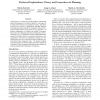Free Online Productivity Tools
i2Speak
i2Symbol
i2OCR
iTex2Img
iWeb2Print
iWeb2Shot
i2Type
iPdf2Split
iPdf2Merge
i2Bopomofo
i2Arabic
i2Style
i2Image
i2PDF
iLatex2Rtf
Sci2ools
129
click to vote
AAAI
2011
2011
Preferred Explanations: Theory and Generation via Planning
In this paper we examine the general problem of generating preferred explanations for observed behavior with respect to a model of the behavior of a dynamical system. This problem arises in a diversity of applications including diagnosis of dynamical systems and activity recognition. We provide a logical characterization of the notion of an explanation. To generate explanations we identify and exploit a correspondence between explanation generation and planning. The determination of good explanations requires additional domainspecific knowledge which we represent as preferences over explanations. The nature of explanations requires us to formulate preferences in a somewhat retrodictive fashion by utilizing Past Linear Temporal Logic. We propose methods for exploiting these somewhat unique preferences effectively within state-of-the-art planners and illustrate the feasibility of generating (preferred) explanations via planning.
AAAI 2011 | Explanation Generation | Intelligent Agents | Linear Temporal Logic | Logical Characterization |
Related Content
| Added | 12 Dec 2011 |
| Updated | 12 Dec 2011 |
| Type | Journal |
| Year | 2011 |
| Where | AAAI |
| Authors | Shirin Sohrabi, Jorge A. Baier, Sheila A. McIlraith |
Comments (0)

